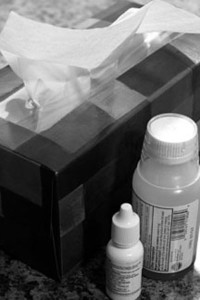True.
Most of us have experienced muscle cramps at some point in our lives, whether being awakened from a deep sleep with hamstring spasms or being unable to finish a tennis match because of cramping calf muscles. Muscle cramps are fairly common, and the severity can range from mild to debilitating.
I experienced this firsthand during a football game when I was a junior in high school. We were playing our cross-town rivals, and it was a hot and humid September night.
I wasn’t the greatest of football players, but I had just sprinted the width of the field to make a touchdown-saving tackle late in the fourth quarter. As I got back on my feet, an immediate pain in my entire abdominal region first bent me over, and seconds later sent me tumbling to the ground, where I lay writhing in pain.
This severe abdominal muscle cramping was one of the most painful things I have ever experienced. After a few minutes of applying ice and stretching those muscles, the cramps subsided and I returned to the game, which we won by one point. e night was memorable because the win earned our team the conference championship—and because of the profound pain I had experienced.
Experts don’t fully understand the cause of muscle cramps. One possible explanation is dehydration and loss of electrolytes such as sodium, often due to sweating. Sodium and other electrolytes are important for muscle function, which could be why muscle cramps often occur near the end of practices or games.
Another possible explanation for muscle cramps is exhaustion or fatigue, again because cramping frequently occurs near the end of sports practices, games, or a long run or bike ride—times of significant exertion or overexertion. ere are small nerves in our bodies that keep muscles from over-firing or over-contracting, and these nerves might malfunction when muscles are fatigued.
The idea of giving athletes pickle juice to prevent cramping gained popularity in 2000 when an athletic trainer for the Philadelphia Eagles served it to his athletes on their way to a 41–14 victory over the Dallas Cowboys in the Texas heat. e trainers reported no player cramping during the game.
Little research has been done on this topic, but one study conducted by Miller and colleagues (2010) showed that pickle juice significantly shortened the duration of electrically induced muscle cramps in dehydrated humans, whereas water had no effect on cramp duration.
It is unlikely that the pickle juice affected hydration or electrolyte levels. e authors speculated that the acetic acid (vinegar) in the juice might have triggered an “inhibitory oropharyngeal reflex shortly after ingestion, which reduces alpha motor neuron activity to cramping muscles.”
In other words, the acetic acid in pickle juice could break the spasm cycle by coming in contact with small nerves in the throat. However, I could find no evidence that consuming pickle juice prior to activity helps reduce muscle cramping.
Miller, K., Mack, G., Knight, K., Hopkins, J., Draper, D., Fields, P., and Hunter, I. Reflex inhibition of electrically induced muscle cramps in hypohydrated humans. Medicine & Science in Sports & Exercise (2010), Vol 42, pp. 953-961.

